Carolina Unmanned Vehicles, Inc. Company Center

4105 Graham-Newton Road
Raleigh
27606
United States
919-851-9898

Sandia 35 Cubic Meter Aerostat with Communication Payload and Surveillance Camera
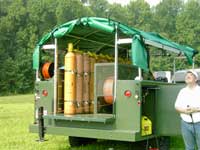
LAS – TR Air Force Prototype Test
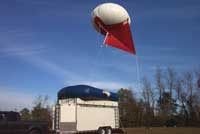
Sandia Helikite being launched From Trailer
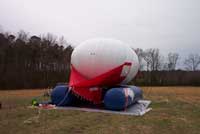
Air Force 64 meter cubed Helikite preparation
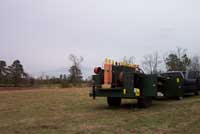
Air Force Carrier trailer with winch, etc. (Cover removed)
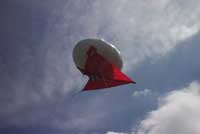
20 cubic meter Helikite testing communication relay payload
Carolina Unmanned Vehicles (CUV), Raleigh North Carolina, is a small woman-owned R and D company with a market focus on autonomous and remotely operated sensor platforms, primarily Unmanned Air Vehicles (UAVs) and related systems.
CUV has developed its Lightweight Aerostat System (LAS) to meet pressing military and homeland security needs for a low cost, responsive, and mobile system to elevate electronic payloads up to a few thousand feet altitude. LAS, consisting of a small specially designed lifting aerostat mounted on a trailer Carrier, can be flown up to several thousand feet to provide coverage 24 hours a day for a week or more without maintenance or downtime. Traditional aerostat systems are large, manpower intensive and vulnerable to adverse weather conditions. CUV’s aerostat system removes these limitations, resulting in a very cost effective system.
LAS consists of several unique components that, taken together, comprise a system far smaller and more versatile than any comparable unit. The Carrier, built by CUV, is a trailer with helium tanks, winch and launch equipment for the Helikite. It mounts all the handling equipment in one trailer towed by a HMMWV or small truck. Many comparable aerostat handling systems are many times larger, and require multiple trucks for carriage. LAS is very mobile and cost-effective through use of unique designs to reduce the need for ground crews to handle the blimp during launch and recovery.
The lifting aerostat built by Allsopp Helikites Ltd. of Great Britain, is smaller and more versatile than comparable units. It has lifting surfaces to support the blimp in winds which drive traditional designs into the ground by wind drag. LAS can be launched in 30 mph winds and to continue operations in 60 mph wind.
Among LAS missions are establishing long term 24/7 security surveillance of border crossings, critical facilities and military base camps. LAS can act as a communications relay platform for voice communications, be a network bridge for interconnecting ground computers and networks, and as relay point for dissimilar communications systems. It may also be used to maintain constant contact with convoys between camp areas without using satellite bandwidth. It is adaptable to other payloads, for missions such as tactical COMINT / SIGINT, where LAS could maintain continuous coverage to detect low power cell phone or IED trigger devices. Specific adaptations can be developed and fielded in few months. Using Commercial Off The Shelf (COTS) technology, it is suitable for military and law enforcement use.
LAS versions have been delivered to the Air Force 46th Test Wing, Sandia National Laboratory, and Lockheed Martin Corporation.
Products & Services
- Optronics, Surveillance and Sighting Systems (Defence)
- Research and Development (Defence)
- Research and Development (Aerospace)
- Unmanned Aerial Vehicles, UAV (Defence)
Last update by Michael E. Rogers, Tue 5 May 2009
